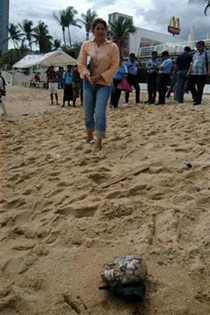 |
 |
 |
 Editorials | At Issue | June 2006 Editorials | At Issue | June 2006  
The War Next Door
 CBS CBS


| | A police forensic agent stands next to a head that washed up on the beach in Acapulco, Mexico on Wednesday June 7, 2006. The gruesome discovery came a short distance from high-rise hotels and open-air discotheques that line Condesa Beach, which flanks Acapulco's touristy Avenida Costera boardwalk. (AP/Gonzalo Perez) |
Acapulco, Mexico, is a popular beach resort that draws tens of thousands of U.S. tourists each year. But as CBS News correspondent Bill Whitaker reports, the streets of Acapulco and other cities near the U.S. border look more like a war zone these days, as drug cartel gangsters with grenades and high-powered assault weapons battle for control of smuggling routes to the lucrative U.S. market. Nowhere is the fighting worse than the small border city, Nuevo Laredo — just a stone's throw across the Rio Grande from Laredo, Texas.

A busy downtown street in Neuvo Laredo was the scene of a recent deadly gun battle that raged for 20 minutes. The Mexican government has sent in troops to quell the violence. But more than 100 people have been murdered in Nuevo Laredo so far this year, including 14 law enforcement officers.

"People have been kidnapped and then burned alive in gas drums," says one journalist, who would speak to CBS News only if his identity was hidden. "These types of deaths have become bone-chilling."

This journalist wanted his identity hidden because the cartels are ruthless. Some gangsters kidnapped by a rival cartel were videotaped being interrogated; one of them was shot. Cartel gunmen attacked a newspaper with automatic weapons and a grenade. Journalists in Nuevo Laredo have been scared into silence.

"We work in fear," the journalist says. "They know who we are. The power and reach of the cartels is so immense [that] they control everything."

Americans used to hope that the violence would stop at the border. But it's already here, says Rick Flores, the sheriff of Webb County, the county around Laredo. Deputies stood guard as he talked with CBS News.

"We had a slaying where an individual was hosed down by machine gun fire, him and his nephew," Flores says. "This is the type of violence we're seeing today."

Seven Mexican cartel members were recently arrested or indicted in Laredo, some in the city's toniest neighborhoods. Farther west in Hudspeth County, sheriffs chased heavily armed smugglers — some in Mexican military uniforms — back across the border. The smugglers torched one vehicle, the sheriffs seized another that was packed with marijuana. Sheriff Flores says everything is escalating — more drugs ... more guns.

"They've got bazookas," says Flores. "They've got 50-caliber weapons. That's the kind of weaponry we're having to come across. How do we fight it?"

With good intelligence and coordinated police work, says the FBI. But even federal agents admit law enforcement can only do so much.

"It's getting bad," says FBI Special Agent John Johnson. "The only way this is going to subside is when one of the cartels dominates."

That's cold comfort for people caught in the crossfire. | 
 | |
 |



